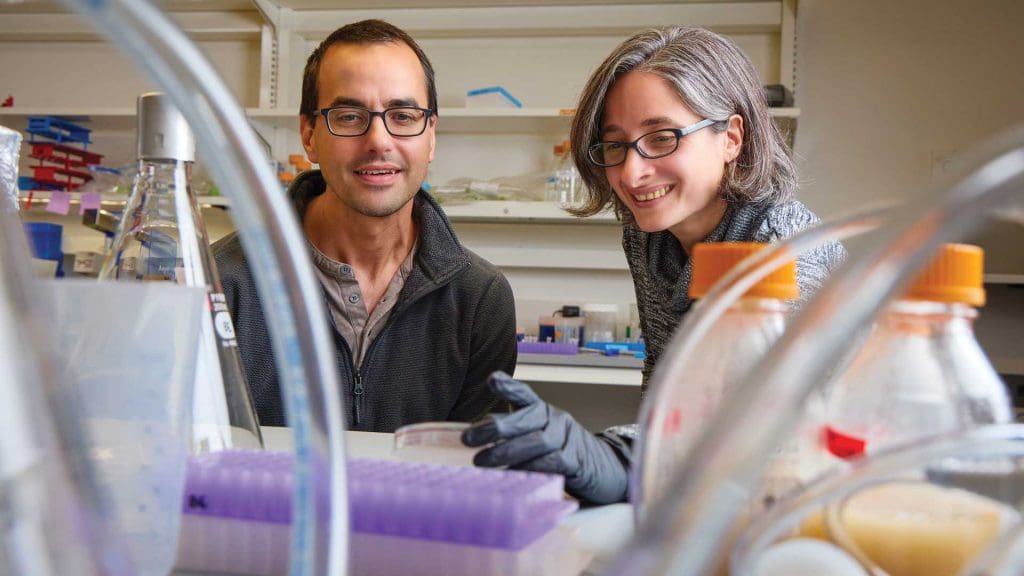
Gira Bhabha and Damian Ekiert are a marriage of two minds. New associate professors in the Department of Biology, these life and research partners founded Bhabha + Ekiert Labs, which they collectively call “the group,” several years ago. The group studies the structural biology and cell biology of microbes, and is now affiliated with Johns Hopkins. Bhabha + Ekiert Labs is an amalgam of professors, postdocs, graduate students, and undergraduates who bring their intellect, energy, and talent to research.
Revealing how microbes interact
Bhabha is a structural biologist and Ekiert’s expertise is in microbiology. The group uses breakthrough imaging technologies—such as cryo-electron microscopy, cryo-electron tomography (Cryo-ET), and super-resolution light microscopy—to reveal the structural mechanisms and cell biology of microbes and how they interact with their hosts.
Two focuses of their group are bacteria and parasites, which can wreak havoc on the species that they infect.
The parasites they study, for example, can cause bee colonies to collapse, reduce yields of farmed seafood, and start fatal infections in patients with AIDS; bacteria can cause serious infections, such as Mycobacterium tuberculosis, which is the leading cause of death due to infectious disease.
“By studying the biology of divergent microbes, you can understand fundamental new biology and lay the foundation for treating intractable disease problems,” Bhabha says.
Fighting microsporidia with technology
One current project investigates complex biochemical mechanisms in the unicellular parasites, microsporidia. More than 1,400 microsporidia species have been reported to date. They pose a devastating threat to agriculture, from honeybees to farmed seafood, and they can also infect humans, and cause fatal illness in patients with compromised immune systems.
“You can apply new technologies developed in the last 10 to 20 years to biological problems that have been known for more than a century and paint a picture of the inner workings of microbes from the level of atoms to cells,” Bhabha says.
Fittingly, the genesis of the Bhabha + Ekiert Labs began in a cell biology class at the University of Chicago, where the two met as undergrads. She was raised in Mumbai and he in Florida. They immediately had chemistry.
The route to Johns Hopkins
During subsequent years, they’ve surmounted one of the greatest challenges to academic couples: being in the same place at the same time. Both trekked west to study for their PhDs at Scripps Research in La Jolla, California. Afterward, Bhabha and Ekiert moved north for postdocs at the University of California, San Francisco, before heading to NYU School of Medicine, where they first established their joint research labs.
“A lab is similar to a small business or a startup, so we decided to tackle it as business partners. From extensive previous collaborations since we were graduate students, we knew we could work well together,” Bhabha says.
Bhabha and Ekiert relocated to Baltimore in April 2024. They packed up and headed south to Baltimore with their two rescue dogs Tesla (“named for the scientist, not the car,” Ekiert says) and Tonto.
“It felt like a good fit, a place where the intensity and interest in fundamental science, as well as the core values, resonated deeply with both of us,” she says.
Both will start teaching in the Department of Biology in spring 2025.




